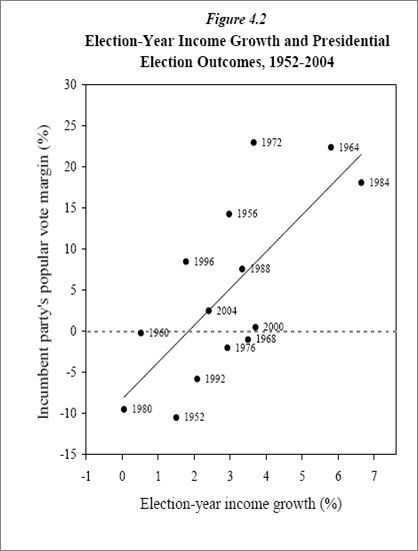This via Paul Krugman

To me the most striking thing was my personal ignorance about growth rates in election years. I have an effortless recollection of which presidencies had high and low growth, but no particular recollection about what the growth rate was in the 4th or 8th year of the presidency. I don't feel so bad, it appears that voters have little recollection of growth in the past. One might blame the past president for poor growth in year one of a presidency, but it makes no sense to let the party of a term limited president off because growth in year 5 or 6 was someone else's fault, yet take growth in year 8 very seriously.
Of course, the best criticisms of the voters is that Presidents don't have that much effect on economic growth and that per capita income in the USA would be amply high enough if it were more equally distributed.
Krugman is reconciling himself to Obama's candidacy (hurray) but worried about the few points which aren't on the regression line (has anyone ever seen a less scattered scatter which is not an identity).
I confront my ignorance looking at specific elections.
One of the things that horrified me and drove me almost insane in 2000 (OK most observers would contest the "almost" part) was that Gore lost in spite of the excellent economic performance when he was vice President.
I get some comfort from the fact that 2000 wasn't extraordinary. The outstanding record was of steady growth over 8 years and people don't care much about it (his vote share was about 5% below predicted, that is, the gap of up about 0.5% was about 10% below expected).
Amazingly Reagan in 1984 came in below the regression line ! My sense is that economic performance under Reagan was, on average, mediocre - better than under Ford, Carter or a Bush but nothing special. However, what counted according to Bartels and, more importantly the data, was just the one year 1984. Similarly Carter came in just slightly below the line. His problem, of course, was that he timed his recession wrong (that is he timed the oil shock wrong, that is he didn't manage to overcome the will of the people of Iran). No need to appeal to panicking during a malaise or helicopter crashes at desert 1.
Tricky Dick (Nixon for younguns) beat the line consistently ?must have been his charm and Charisma (speaking of which Kennedy only ran in one election and came in with a winning margin 7% lower than expected. Glamor, charisma, not sweating like a pig on TV all together worth -7% wow.
In fact, the one variable which would add most to the model is "Richard Nixon on the ticket" which is a huge huge plus for that ticket. When challenging for President in 68 there is one of the 2 most outstanding performances for challengers, the other was when he ran from opposition for vice President in 1952. He was an incumbent President or vice President running for President or Vice President in three of the 4 most outstanding performances for the party of the incumbents.
On reflection, the most amazing thing is that some political scientists and more pundits have managed to avoid recognizing a pattern which is so strong, or rather refused to admit that it is so strong. Election results which are almost exactly predicted by the Bartels equation are ascribed to ideological flux or, especially, the personality of candidates. Kennedy and Reagan are considered extraordinary candidates on the basis of rather less than nothing on average. Nominating Goldwater is considered to be suicidally extreme, but he managed to come close to Bartel's simple prediction. Carter's defeat is entirely explained by a recession. The outstanding politician, by far, is the charming Richard Nixon about whose character there can be no doubt whatsoever.
No comments:
Post a Comment